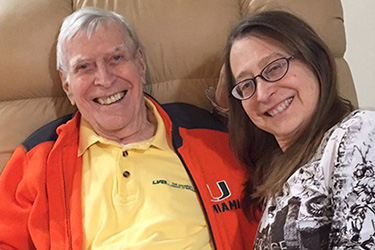
“Dad moved here (to Birmingham) after my mom passed. My husband, who’s also a physician, and I took care of him at home,” Harding relates. “I knew that we needed help making a decision about hospice, and I reached out to Dr. Tucker for advice.”
Dr. Rodney Tucker, director of the Center for Palliative and Supportive Care at UAB, visited the Hardings at home. They agreed it was time for her to stop being Darrel’s caregiver and step back into the role of daughter. Darrel was admitted to St. Martin in the Pines skilled nursing facility where Harding expected to be able to visit frequently and reassure her father with her presence and care.
Then, the world turned upside down. The COVID-19 pandemic intensified, and visitors were no longer allowed to minimize the risk of spreading the infection.
“My dad always had his family around him. I was devastated. There was no other access, no way to drive by. I didn’t know what to do,” Harding shares. “I didn’t want him to feel deserted.”
So, Harding did the next best thing. On Tucker’s advice, she wrote down all the little personal details she would have told the nurses and staff as if she was there in person. The fact that he liked to watch Animal Planet. His love of ice cream, and his distaste for rice. His preference for cold drinks that felt better when he swallowed. And that no one needed to make him wear his oxygen if the canula made him uncomfortable. She emailed it to her dad’s social worker and asked that it be taped on the wall.
The effort, and the health care team’s response, brought her some peace of mind. “It’s the little things that mean so much,” Harding says.
Darrel passed away peacefully on April 3, and his story inspired Dr. Tucker to discuss with his palliative care team how knowing details like this could help other patients in isolation. He worked with Dr. Sylvia Huang and others to develop a form called “Meet My Loved One.” It’s a simple list of preferences that communicates to the health care team, enabling them to provide personalized care.
Tucker often describes his specialty as “an extra layer of compassion.” Never has this palliative approach been more important. Our need for human connection, to know and be known, is a determinant of our health outcomes. In isolation, this new instrument can provide the link to care that comforts hearts and minds when the physical touch of a loved one isn’t an option.
“I’m grateful to know that this tool is helping others. It’s something my dad would have appreciated a lot,” says Harding. “And I look forward to seeing this expand to other means of care outside end-of-life.”